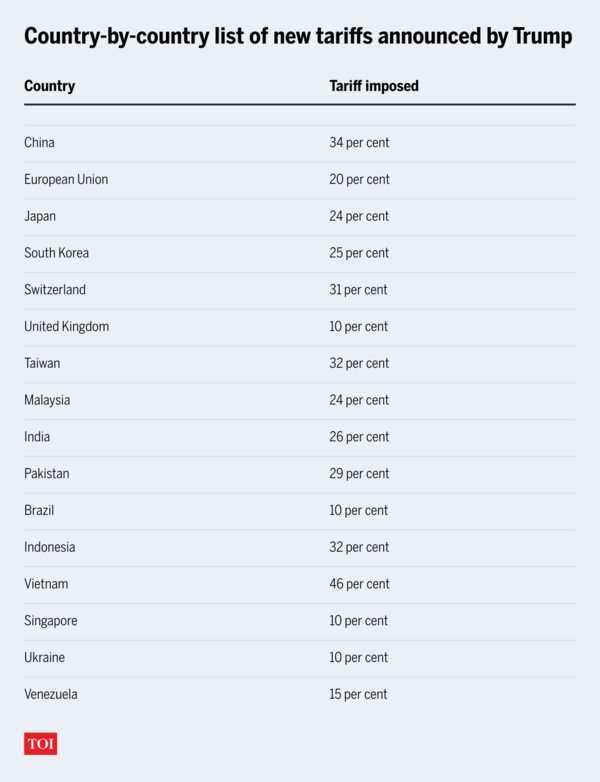‘They are closing us and they understood it’: Trump’s tariff speech

US President Donald Tusrap On Wednesday, he announced a wide set of tariffs in the declaration of “economic freedom”, igniting the fears of a global trade war. Speaking from the White House Rose Garden, Trump announced that April 2, 2025, “would be remembered forever because the US industry was reborn.”
In his address, the President insisted that domestic manufacturing would increase as companies withdrew production in the United States. While the economic impact remains uncertain, Trump was firm in its stand against imports without proper tariffs, saying that nations needed to accept “a little tough love”.
‘Foreign Theater’ and ‘Tuff Love’
Trump reprimanded the international trade practices, blaming foreign countries for reducing the American economy.
Voting
What do you think what is the primary goal of Trump’s tariff?
Trump announced, “Foreign leaders have stolen our jobs, foreign theaters have broken our factories, and foreign scavengers have tore our once-beautiful American dreams.” “But this is not going to happen now.”
economic freedom’
Trump said, “For decades, our country has been looted, beaten, raped and both friends and enemies have been looted equally,” has been raped, and by nations nearby. “
“This is one of the most important days, in my opinion, in American history. It is our announcement of economic freedom.”
The President promised that tariffs would bring back the job and promote the domestic industry. “Jobs and factories will return to our country, and you are already looking at it. We will supercharged our domestic industrial base. We will open foreign markets and break foreign trade obstacles, and eventually, more production at home will mean strong competition and low prices for consumers.”
PM Modi is ‘a great friend of mine,’ Trump says
“India, very, very difficult. Very, very difficult. Very difficult.
A ‘philanthropist’ approach?
Despite imposing a “minimum base line” 10 percent tariff on business partners, Trump depicted his policy as a proper and liberal solution.
“We are very kind,” the President claimed. “We will charge them by about half that they are and are charging us.”
He had a message to the nations unhappy with the new tariff, “If they complain, if you want your tariff rate to be zero, you build your product here in America.”

Trump announces mutual tariff
China in Crosshair
China topped the list of tariff targets organized during its speech, claiming that Beijing imposed a tariff of 67 percent on US goods including manipulation in currency.
“So we are going to charge a discounted charge Mutual fee Among the 34 percent “Trump said.” They accuse us, we accuse them, we charge less than them. So how can someone get upset? They will be, because we never charged anything with anyone. But now we are going to charge. ,
He said that Chinese President Xi Jinping, along with other world leaders, understands the need for tariffs, which he refers to those on Chinese steel and other products during his first term.
“They all understand that we are going to go with a little tough love, perhaps. But they all understand. They are ripping us and they understood it.”
Historical justification
Trump called for history to support his policy, pointing to an era when Tariff played a central role in American revenue.
Trump, citing Conservationist President William McKinley as a historic hero, said, “We were a tariff-supported nation from 1789 to 1913, and the United States was the most rich,” Trump said, “Trump said as a historic hero.
He criticized the introduction of income tax in 1913, claiming that it transferred financial burden on American citizens rather than foreign nations.
“For unknown reasons for mankind in 1913, he established income tax so that citizens would start paying the funds required to run our government instead of foreign countries,” Trump said. “Then in 1929 it all suddenly ended with great depression. And if they lived with tariff policy, it would never have happened.”
However, his interpretation of history ignored the extended economic factors such as global financial instability, banking crisis and 1929 stock market accidents.
Any other ‘economic surrender’
Trump’s Tariff expanded beyond China to include other Asian economies and the European Union, but also set a target for North American trading partners.
“The United States can no longer continue with a policy of unilateral economic surrender,” he said. “We cannot pay the deficit of Canada, Mexico and many other countries. We used to do it anymore.”




